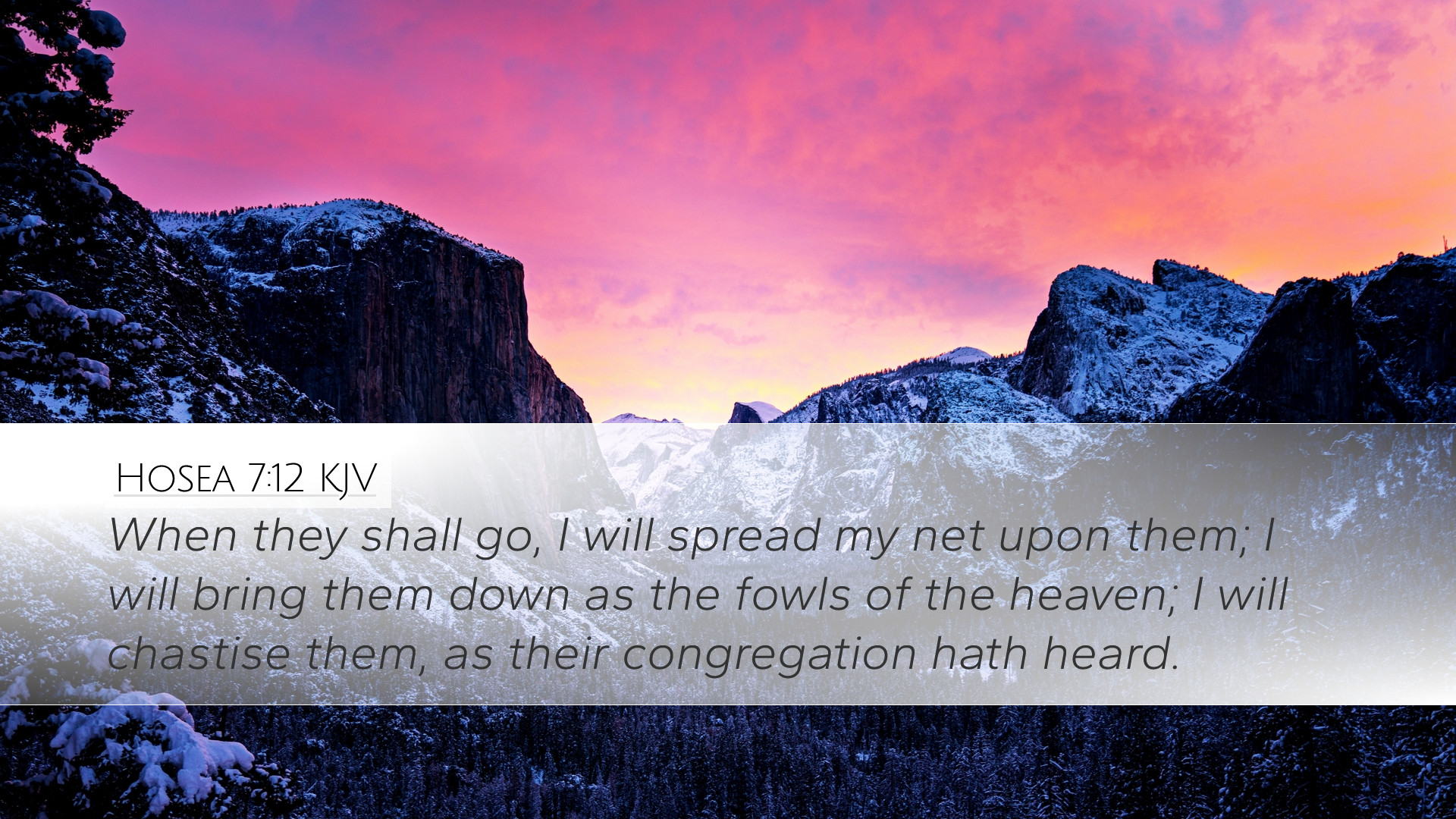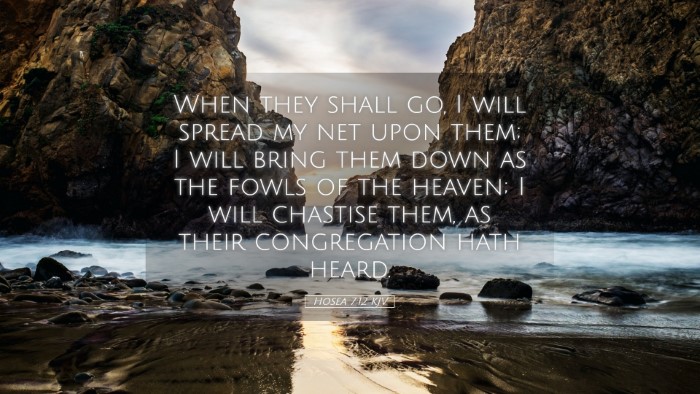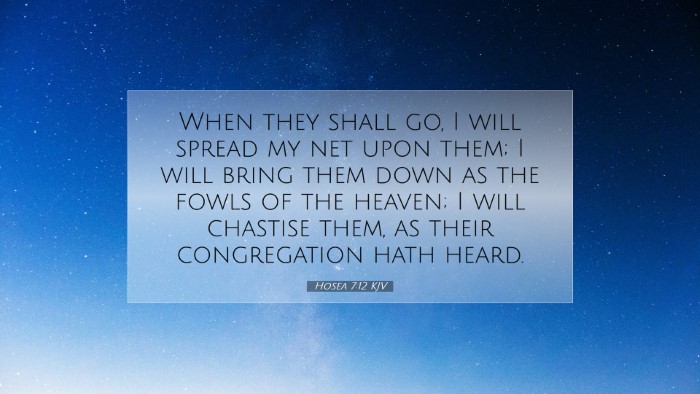Old Testament
Genesis Exodus Leviticus Numbers Deuteronomy Joshua Judges Ruth 1 Samuel 2 Samuel 1 Kings 2 Kings 1 Chronicles 2 Chronicles Ezra Nehemiah Esther Job Psalms Proverbs Ecclesiastes Song of Solomon Isaiah Jeremiah Lamentations Ezekiel Daniel Hosea Joel Amos Obadiah Jonah Micah Nahum Habakkuk Zephaniah Haggai Zechariah MalachiHosea 7:12
Hosea 7:12 KJV
When they shall go, I will spread my net upon them; I will bring them down as the fowls of the heaven; I will chastise them, as their congregation hath heard.
Hosea 7:12 Bible Commentary
Commentary on Hosea 7:12
Bible Verse: "When they go, I will spread my net upon them; I will bring them down like the birds of the air; I will chastise them according to the report of their congregations."
Historical Context
The book of Hosea was written in a tumultuous period of Israel's history, characterized by political instability and moral decay. Hosea, often referred to as the "prophet of love," delivered his messages during the reigns of several kings of Israel. His prophetic ministry primarily addressed the northern kingdom, where idolatry and unfaithfulness to Yahweh were rampant.
Textual Analysis
This verse employs vivid imagery and metaphors to illustrate God's impending judgment upon Israel for their continued rebellion. The reference to "spreading a net" signifies a trap or snare, indicative of divine judgment coming upon a wayward and unrepentant people.
Divine Sovereignty and Judgment
Hosea presents God as sovereign and just, executing judgment in response to the people's transgressions. The phrase "I will chastise them" underscores not only punishment but also a corrective purpose, indicating God's desire for restoration rather than destruction.
Commentary Insights
-
Matthew Henry:
Henry interprets this verse as a warning of the divine wrath that awaits those who indulge in sin without repentance. He emphasizes that God's judgments are meant to lead the sinner back to Him. The metaphor of birds falling into a net brings to light the concept of God's omniscience—He sees all and is able to ensnare those who think they can evade justice.
-
Albert Barnes:
Barnes notes that God's judgments are not arbitrary but are based on the "report of their congregations." This phrase implies that the sins of the people were widely known, and thus, their punishment would reflect their public sins. Barnes reminds readers that the aim of God’s chastisement is to bring about repentance and recognition of the true nature of sin.
-
Adam Clarke:
Clarke highlights the significance of the net metaphor, suggesting that it represents both entrapment and the inevitability of judgment. He draws parallels between this imagery and other scriptural references, showcasing a tradition of God utilizing various means to direct His people back to Himself. Clarke also notes that the 'chastisement' can refer to both physical and spiritual consequences, emphasizing the comprehensive nature of God's discipline.
Theological Themes
This verse encapsulates several key theological themes relevant to contemporary readers:
-
God’s Justice:
The justice of God is evident in His willingness to discipline His people. His approach is not capricious; rather, it is a reflection of His holiness and desire for His people's well-being.
-
The Nature of Sin:
Hosea's declaration about the report of their congregations indicates that sin has communal implications. The people are collectively accountable, reminding readers of the social dimensions of sin.
-
Repentance and Restoration:
The ultimate goal of divine discipline is repentance. This verse calls for introspection among believers, prompting them to consider their own lives and financial entrapments.
Practical Applications
For pastors, students, theologians, and Bible scholars, several practical applications arise from this commentary:
-
Understanding Divine Discipline:
This verse encourages a deep understanding of how God uses discipline to draw His people closer to Him. Pastors can utilize this understanding in their teachings on repentance and grace.
-
Encouraging Accountability:
The community aspect of sin underlines the importance of accountability within the church. Leaders should foster environments where congregants support each other in their spiritual journeys.
-
Promoting a Theology of Hope:
Even amidst judgment, the hope of restoration is paramount. Scholars can reflect this in their studies, emphasizing that God’s ultimate intention is to reconcile and restore His people.
Conclusion
The rich theological implications of Hosea 7:12 provide a fertile ground for reflection and teaching. The imagery of judgment coupled with the promise of correction can inspire both sober reflection on sin and the joyous pursuit of restoration found in God. As leaders and scholars engage with this text, the main takeaway remains: divine correction is rooted in love, aiming to restore the broken relationship between God and His people.


